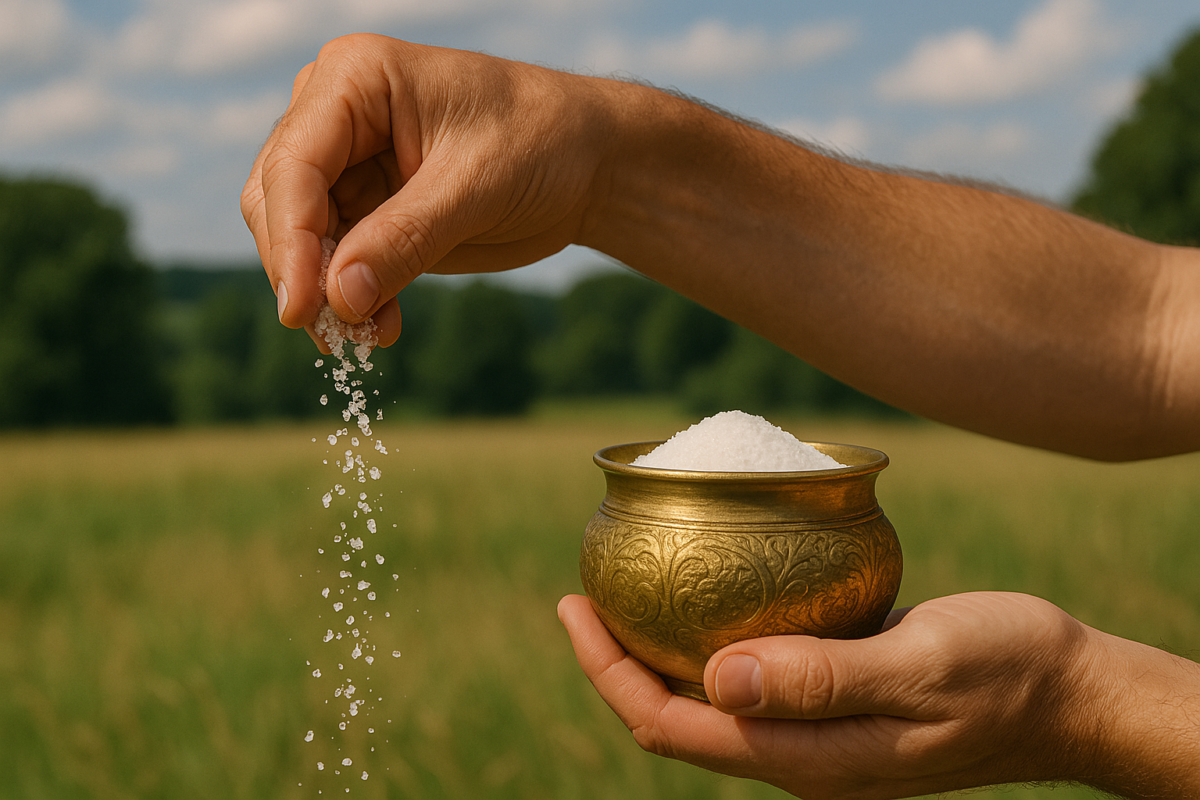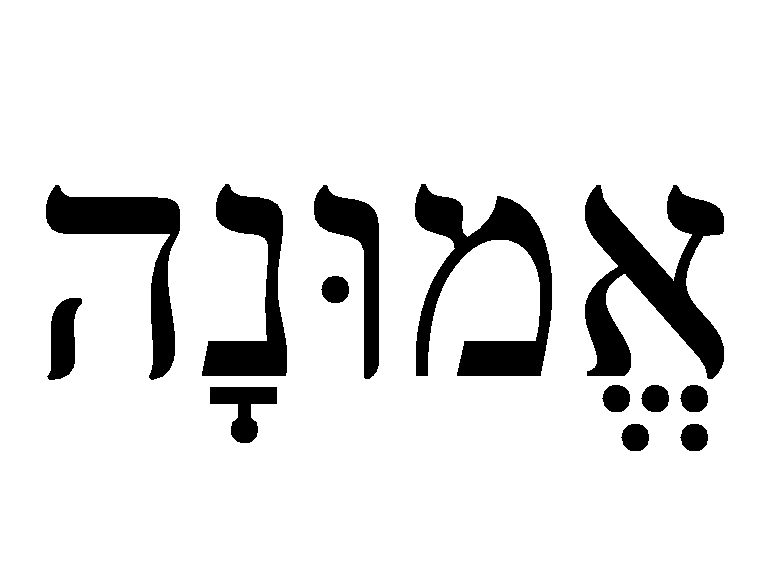A Little Salt Goes a Long Way

Rectifying the Lust for Money
It is written (Vayikra 2:13): וְכׇל־קׇרְבַּן מִנְחָתְךָ בַּמֶּלַח תִּמְלָח וְלֹא תַשְׁבִּית מֶלַח בְּרִית אֱלֹקֶיךָ מֵעַל מִנְחָתֶךָ עַל כׇּל־קׇרְבָּנְךָ תַּקְרִיב מֶלַח (And every minchah offering of yours, you shall season with salt, and you shall not allow the salt of the covenant of your G-d to cease from upon your minchah offering, upon all your offerings you must offer salt). Rhetorically, R' Acha asked a simple question (Zohar ha-Kadosh, Vayechi 241b): וְכִי אַמַּאי מֶלַח (Why salt?). His answer also seems fairly straightforward: אֶלָּא בְּגִין דְּאִיהוּ מְמָרֵק וּמְבַשֵּׂם מְרִירָא לְאַטְעָמָא (Because it sweetens and adds a pleasant aroma to the bitterness of the taste). True, many foods are bland and unappetizing, and we all know that a little bit of salt tends to make them tastier and more enjoyable, but do we really need Chazal to tell us this?
The words of Chazal are deep and multi-layered, and therefore, it's possible that R' Acha's words might not be so pashut. Let's continue reading in the Zohar: וְאִי לָאו הֲוֵי מִלְחָא לָא יָכִיל עַלְמָא לְמִסְבַּל מְרִירָא (And if not for the salt, the world would not be able to handle the bitterness). Initially, we had assumed that R' Acha was talking about enhancing the taste of food with salt, but that's not the case at all. Read his words again. He didn't mention food. We mentioned food. Rather, he was using a mashal of salting tasteless or even bitter food to teach us something deeply profound about our shared experience of living in this physical realm. That being the case, what is the nimshal, i.e. the spiritual reality about the salt and the food of which he was hinting at through the mashal?
Referring to this specific teaching by R' Acha, R' Nachman explains (Likutei Moharan 23:2): כִּי בְּרִית הוּא בְּחִינַת מֶלַח הַמַּמְתִּיק מְרִירוּת וְעִצְּבוֹן הַפַּרְנָסָה (For brit is the aspect of salt, that sweetens the bitterness and hardship [itzavon] of [having to make one's] parnasah). We will need to unpack this a bit, but at least for now we can see what the nishmal is all about – the tasteless or bitter food corresponds to the bitterness and hardship we experience in having to earn a living, and the salt corresponds to our brit, specifically the guarding of our brit, the covenant of kedushah relating to brit milah. In other words, the tasteless and bitter hardship that we experience just to earn a living is sweetened or made palatable when we take care to guard our holy brit.
To understand the connection between these two ideas we'll need to return to the garden. As is known, after Adam and Chavah ate from the fruit of the tree from which they were told not to eat, they were banished from Gan Eden. However, before they were sent into galut, a judicial sentence was handed down to each of them. Here is part of what Hashem said to Adam (Bereshit 3:17): בְּעִצָּבוֹן תֹּאכְלֶנָּה כֹּל יְמֵי חַיֶּיךָ (Through hardship [itzavon] you will eat of it [i.e. the ground] all the days of your life). The word itzavon has been translated in many different ways, i.e. hardship, toil, pain, sorrow, bitterness, etc. Call it what we may, but Hashem was putting Adam on notice that, contrary to what he had experienced in the garden, his life was going to change – dramatically. From now on, he would experience hardship just to have enough food to survive. No more freebies. It wasn't going to be a walk in the park. It'd be tough. And it wouldn't really be a spiritually satisfying experience. And yet, in all fairness to Hashem's Attribute of Justice, Adam received a perfectly righteous sentence commensurate with his crime. As he sinned through eating, his tikkun would need to come through eating.
And yet, many of us today no longer feel this way about earning a living. On the contrary, we seem to enjoy it. Or if we don't actually enjoy it, we tend to justify it because we seem to enjoy the fruit of that labor. What happened to us? Why is there such a disconnect between what Hashem told Adam and what we tell ourselves? The answer is that we got so used to the taste of bitterness that we don't recognize it anymore. We've been in galut so long that we lost our spiritual sense of taste. We became desensitized to bitterness and hardship. So what are we supposed to do now? Is there any way to regain our sensitivity and our true sense of taste?
Although we all need a certain amount of parnasah to survive down here – after all, this was the sentence, i.e. the tikkun, handed down by Hashem to Adam – there is a great danger involved in its pursuit. It is easy to lose one's focus and fall into the 'appetite' or lust for money [תַּאֲוַת מָמוֹן, ta'avat mammon]. How can we determine if we have, chas v'shalom, fallen into such a lust?
The Oteh Ohr explains on Likutei Moharan 23 that the ta'avat mammon can be broken down into five components. So all we have to do is ask ourselves a question based on each of these points to assess how we're doing. Let's give ourselves the test. First, do we conduct our business matters with complete emunah or do we cut corners here and there, trying to make as much money as possible without being completely upright, honest and truthful? Second, do we really believe that Hashem can provide us with sufficient parnasah with little effort on our part, or do we feel that we have to put in a lot of hours every week to make ends meet? Third, after we earn some money, do we tend to praise ourselves and say that we were able to achieve what we did through our own efforts? Fourth, are we happy with our portion or do we feel like, no matter how much we have, we still want more? And finally, do we keep our wealth for ourselves or are we generous in giving tzedakah, even going above and beyond the standard ten percent?
If we didn't emerge completely clean and innocent after testing ourselves with these questions – and seriously, who can say, 'I'm totally clean, I'm completely pure'? – then we have to admit, at least to ourselves, that we have sunk into the ta'avat mammon.
But it goes just a little bit deeper than this. Hang on to your hat and let's read what R' Nachman teaches further about this ta'avah (L.M. 23:1): וְאֵלּוּ בְּנֵי אָדָם הַנּוֹפְלִים בְּתַאֲוַת מָמוֹן וְאֵינָם מַאֲמִינִים שֶׁהַקָּדוֹש־בָּרוּךְ־הוּא יָכוֹל לְפַרְנֵס אֶת הָאָדָם בְּסִבָּה קַלָּה וְרוֹדְפִים אַחַר פַּרְנָסָתָם בִּיגִיעוֹת גְּדוֹלוֹת וְהֵם אוֹכְלֵי לֶחֶם בְּעִצָּבוֹן...וְעַצְבוּת הוּא מָרָה שְׁחוֹרָה – אֵלּוּ בְּנֵי אָדָם נִקְשָׁרִים בְּפָנִים דְּסִטְרָא אָחֳרָא, אֱלֹהִים אֲחֵרִים, חֹשֶׁךְ, בְּחִינַת מִיתָה (These people who have fallen into the ta'avat mammon and they don't believe that Ha-Kadosh, baruch Hu, can provide a person's parnasah with his little effort, and they chase after their parnasah with great toil and they eat their bread in itzavon...and the [related] word sadness [atzvut] is [really] depression – these people are connected to the countenance of the Sitra Achra, 'other gods', darkness – the aspect of death). That's heavy, but if you can handle it, let's go deeper.
R' Nachman goes on to state: וְעֲלֵיהֶם נֶאֱמַר 'וּזְהָבָם לְנִדָּה', הַיְנוּ בְּחִינַת עֲבוֹדַת אֱלִילִים (About them, it is said [Yechezkel 7:19]: 'their gold is [comparable] to a niddah', i.e. an aspect of idolatry). In other words, if we failed any of the five test questions above, then our 'gold', i.e. our money, is an aspect of an idol and is comparable to a niddah. How is it comparable to a niddah? R' Akiva taught in a Mishnah (Shabbat 82a): מִנַּיִין לַעֲבוֹדָה זָרָה שֶׁמְּטַמְּאָה בְּמַשָּׂא כְּנִדָּה שֶׁנֶּאֱמַר: ״תִּזְרֵם כְּמוֹ דָוָה צֵא תֹּאמַר לוֹ. מָה נִדָּה מְטַמְּאָה בְּמַשָּׂא, אַף עֲבוֹדָה זָרָה מְטַמְּאָה בְּמַשָּׂא (From where do we learn that an idol transmits tumah [to the person just] by carrying [even without physical contact], as does a niddah? It says [Yeshayahu 30:22], 'You will throw them [i.e. the idols] out like a niddah: Get out! You will say to it [i.e. to the idol].' Just as a niddah transmits tumah by carrying, so too an idol transmits tumah by carrying). Therefore, just by having the idolatrous money in our pockets (if it is, in fact, an idol based on our self-assessment of the five questions above), according to R' Akiva we become tamei, and then when we give that money to others, they also become tamei. So even if you passed the five-question test with flying colors, more than likely, you've been made tamei by possessing the idols of others. What a mess!
At least we have some idea why we'll need to throw out our money at the revelation of Mashiach, as indicated by the prophet (Yeshayahu 2:20): בַּיּוֹם הַהוּא יַשְׁלִיךְ הָאָדָם אֵת אֱלִילֵי כַסְפּוֹ וְאֵת אֱלִילֵי זְהָבוֹ (In that day, a man will throw out his gods of silver and his gods of gold). Now this pasuk isn't talking about pagans. It's talking about B'nei Yisrael. But do we have idolatrous statues of silver and gold these days? Probably not. So although we don't generally have idolatrous statues today, we do have idols functioning as silver and gold.
Practically speaking, what are we supposed to do about this? We have to work on getting a 5 out of 5 in the five-question test. But how can we possibly do that? Are we not living under the judicial sentence handed down by Hashem to Adam – בְּעִצָּבוֹן תֹּאכְלֶנָּה כֹּל יְמֵי חַיֶּיךָ (Through itzavon you will eat of it all the days of your life)? Yes, we are. But we can lessen the severity of the itzavon. How? It is as R' Acha taught. We need salt to sweeten the bitterness of earning a living.
And this is where guarding our holy brit comes into the equation. R' Nachman explains the connection (L.M. 23:2): וְדַע, שֶׁעַל־יְדֵי תִּקּוּן בְּרִית קֹדֶש הוּא נִצּוֹל מִפָּנִים דְּסִטְרָא אָחֳרָא. עַל־יְדֵי דַּם בְּרִית, נִתְתַּקֵּן דַּם נִדָּה, תַּאֲוַת מָמוֹן (We need to know that through rectification [tikkun] of the holy brit one is saved from the countenance of the Sitra Achra. Through the blood of brit, one sweetens the blood of niddah, i.e. the ta'avat mammon). How does this work? When one is steeped in lusts, including the lust for money, spiritually speaking, one has fallen into a pit – a pit of itzavon, i.e. sadness, depression, hardship, toil, etc. This is the explanation of what the prophet wrote (Zecharyah 9:11): גַּם־אַתְּ בְּדַם־בְּרִיתֵךְ שִׁלַּחְתִּי אֲסִירַיִךְ מִבּוֹר אֵין מַיִם בּוֹ (Also, you, through the blood of your brit, I will send your prisoners from the pit that has no water in it). The sad truth is that we have imprisoned ourselves through our own lusts. And no greater prison exists than the one that we have set up for ourselves. Yet, the bright side is that no prison is easier to be released from than the one we set up for ourselves.
Therefore, the rectification or tikkun of our holy brit, i.e. every action we do to successfully guard our holy brit against being further blemished, along with every action we undertake to guard our eyes from seeing any forbidden sights, is the blood of the covenant. Hashem is willing to exchange blood for blood: the blood of the brit, i.e. keeping our holy brit pure and holy, for the blood of the niddah, i.e. the lust for money. This means that to the extent that we rectify our brit, to that extent we will automatically reduce our lust for money. It will happen on its own. We won't have to force it. Just as the sun rises at dawn and sets in the evening, one's lust for money will be weakened as we work on the tikkun of our brit. This is the salt of the covenant that sweetens the itzavon of earning a living and having to provide parnasah for oneself and one's family. As stated in L.M. 23:5: כִּי תִּקּוּן שֶׁל תַּאֲוַת מָמוֹן הוּא תִּקּוּן הַבְּרִית מֶלַח (The tikkun of the ta'avat mammon is the tikkun of the covenant of salt). And really, it's all just a matter of emunah, isn't it? The more we strengthen our emunah, the more we'll be able to rectify our brit, and the more we will come up out of the pit of depression and sadness associated with the curse of having to earn parnasah.
This is why the pasuk with which we began this study said וְלֹא תַשְׁבִּית מֶלַח בְּרִית אֱלֹקֶיךָ (and you shall not allow the salt of the brit of your G-d to cease). What a strange expression – 'the salt of the brit of your G-d'. Hopefully, we now know what it means. As long as we live in the pit, fallen and sunken into the ta'avat mammon, we have 'other gods'. But the moment that we rectify our holy brit, i.e. through the application of 'salt' which sweetens or mitigates the severity of the itzavon associated with having to earn one's parnasah, then Hashem becomes 'our G-d'. No more will we serve 'other gods' such as the dollar, the euro, the shekel, etc., but we will serve only Hashem and He will truly be our G-d.






![Blood [is] Money](https://www.theshoemakerreport.com/wp-content/uploads/2025/02/doctor.healer-768x429.jpeg)